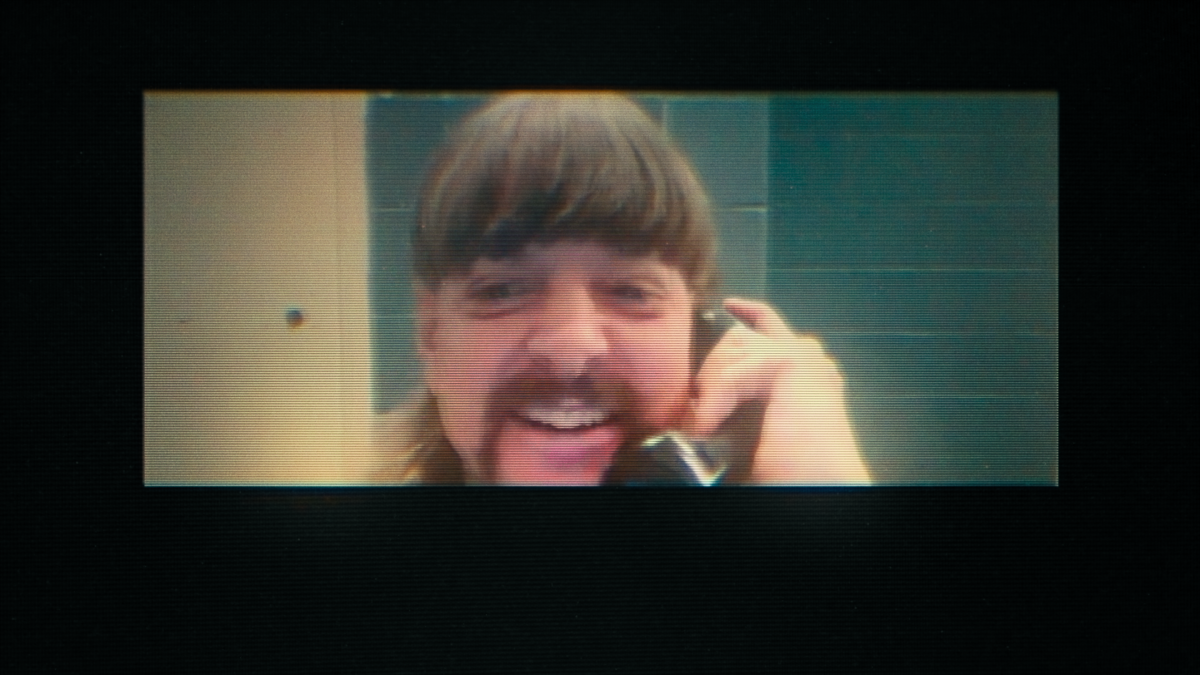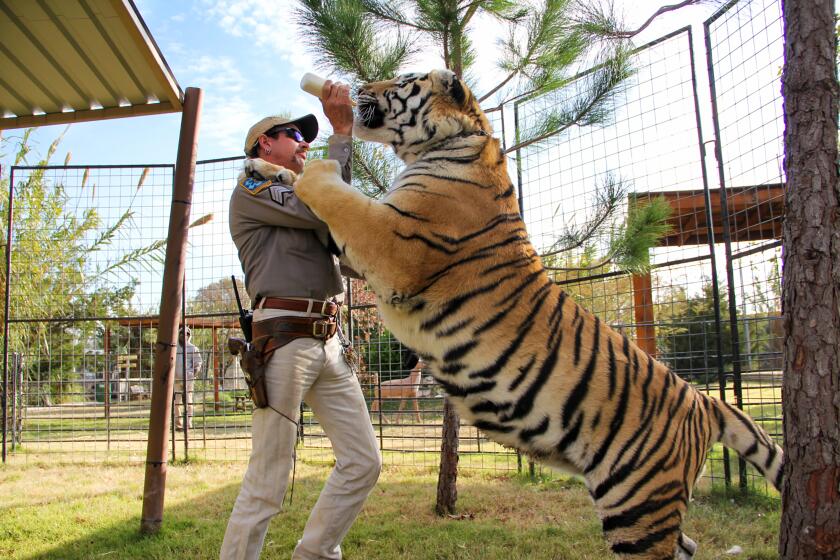‘Tiger King 2’ is the pinnacle of reality TV cynicism

With the release of “Tiger King 2,” Times TV critic Lorraine Ali dug into (she might say waded through) five episodes’ worth of new material in Netflix’s bombastic docuseries, which took the world by storm in the early days of the COVID-19 pandemic. Senior editor Matt Brennan had some questions for her about her reaction to the sequel, which premiered Wednesday with little fanfare — including whether it addressed her criticisms of the original, and whether she would recommend it as worth a watch.
The complete guide to home viewing
Get Screen Gab for everything about the TV shows and streaming movies everyone’s talking about.
You may occasionally receive promotional content from the Los Angeles Times.
In the lead-up to “Tiger King 2,” you wrote that the sequel would have a lot of work to do to make up for the misogyny directed toward Big Cat Rescue owner Carole Baskin — and the trailer didn’t give you much hope. Now that you’ve watched, what say you?
Unsurprisingly, there wasn’t much soul-searching done by the filmmakers between series.
Episodes 2 and 3 of “Tiger King 2” exist solely to cast doubt on animal conservationist Baskin, whom small zoo owner Joe Exotic was obsessed with destroying throughout the original. His hatred of her fueled a dramatic storyline in the 2020 series, when he used the platform to spread the rumor that she killed her former husband, Don Lewis, who went missing in 1997. When the Netflix docuseries blew up, Baskin, who was already hated by many men in the macho big cat world for her animal rights campaigning, was trolled by a much larger swatch of haters.
The “Tiger King 2” filmmakers are clearly aware of the issue, since they flick at it early on in the first episode via a PETA representative who briefly addresses the misogyny and the public’s disturbing reaction to Baskin (especially compared with the series’ many seedy male figures). . But in the main she’s still unfairly cast as a murderous Black Widow type. After all, the series is not about Joe Exotic. He’s rarely in the sequel, save for a few calls from prison, where he’s serving time for hatching a murder-for-hire plot against Baskin. Yet the filmmakers still treat him as the sympathetic figure in this story, providing a brief bio about what made Joe the complicated man he is today — a tender youth, an abusive father, the death of a sibling, an ex-wife who recalls when she discovered he was gay. Then it’s on to Exotic’s beef with Baskin again, repurposed into a missing person/murder investigation, and a closer look at his former co-horts Jeff and Lauren Lowe, Allen Glover and James Garretson, who Exotic claims framed him.
Netlfix’s docu-sensation focused much of its attention on maligning Carole Baskin. Can the sequel erase the problems that plagued the original?
With the benefit of hindsight — and, now, more “Tiger King” — do you think the docuseries would have become the phenomenon it is if not for its timing, right at the start of COVID-19 shutdowns in the U.S.?
Shutdown certainly helped turn that madcap world of roadside zoo folk into a hit series. It was a scary, dark time and we were a captive audience. The absurdity of Joe Exotic — polygamist, country music singer, tiger tamer, political candidate — and the shady characters of the wildlife exhibitor world were the perfect dumpster fire for imperfect times. I don’t think it would have been as big a phenomenon in the Before Times, though it did and still does hook into conspiracy theory culture, so maybe that alone would have driven its success. “Tiger King 2” really amplifies the antisocial, vigilante aspect of the world it covers. The anti-law enforcement, anti-government, anti-media paranoia of personalities such as Tim Stark can be seen as heroic or pathetic, depending on who’s watching.
You’re a big true crime buff. What do “Tiger King” and “Tiger King 2” tell you about the state of the genre, and Netflix’s approach to it?
“Tiger King 2” pushes into true crime territory with the disappearance of Don Lewis, and its “investigation” into what happened — but in the end it’s laughable. And maybe that was the point. The “Tiger King” franchise is all about attention-seeking figures doing ridiculous or horrible things for notoriety, such as keeping wild animals on dilapidated little zoos where they cannot or will not care for them properly. But they rely on a YouTube armchair detective named Ripper Jack to crack the case, and the testimony of eccentric friends, embittered exes and psychics with a penchant for vomiting when they’re upset. It’s a crazily entertaining cast for a “Tiger King” reality show, but troublesome when used as sources in a murder investigation.
Baskin refused to participate in the follow-up, so they pulled footage from hours of her own uploaded YouTube videos and dropped that in the mix to create a damning narrative. The other “case-cracking” aspects of the series revolve around the claim that Exotic was framed, but the evidence and testimonials are more like a three-ring circus fashioned out of leftovers from the original series.
The most cynical bit of all? The series that barely explored the exploitation or abuse of animals, but canonized their keepers, ends on a conservationist note. Bigs cats seized from Lowe’s and Stark’s zoos now roam free at a wildlife rescue reserve. They are finally safe. Please! The franchise always put the king before the tigers, so we’re all of a sudden supposed to believe they care?
“Tiger King” is the Netflix docuseries the internet can’t stop talking about. And like much of true crime, its trashiness isn’t just a harmless diversion.
Does the sequel have anything to recommend it?
If you can stomach the humans, there are some cute cubs.
More to Read
The complete guide to home viewing
Get Screen Gab for everything about the TV shows and streaming movies everyone’s talking about.
You may occasionally receive promotional content from the Los Angeles Times.









